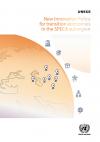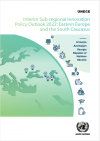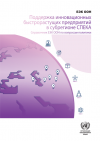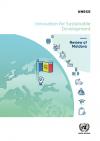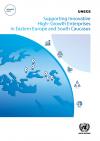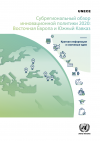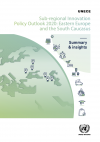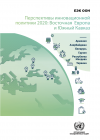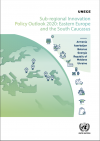Publications
Displaying Results 1 - 11 of 11
- English
Innovation – or the systematic experimentation with new ideas – is essential for the sustained economic growth and enhanced competitiveness of the seven countries of the United Nations Special Programme for the Economies of Central Asia (SPECA), i.e., Afghanistan, Azerbaijan, Kazakhstan, Kyrgyzstan, Tajikistan, Turkmenistan and Uzbekistan, to achieve sustainable development in line with the UN
- Pусский
Пандемия COVID-19 и война на Украине негативно сказались на экономическом развитии стран-членов ЕЭК ООН, значительно нарушив международную торговлю, инвестиции и сотрудничество. Из-за своего географического положения и стадии развития эти удары особенно сильно повлияли на страны с переходной экономикой, такие, как страны Восточной Европы и Южного Кавказа (ВЕСК) – Армению, Азербайджан, Грузию,
- English
The COVID-19 pandemic and the war in Ukraine have negatively affected economic development in UNECE member States, significantly disrupting international trade, investment and cooperation. Because of their geographical location and development stage, these shocks have hit especially hard in transition economies in Eastern Europe and the South Caucasus (EESC) – Armenia, Azerbaijan, Georgia, the
- English
The UNECE region, including the participating countries of the United Nations Special Programme for the Economies of Central Asia (SPECA), have recently faced a number of challenges, such as the COVID-19 pandemic and resulting economic downturn, the impact of military conflict in Ukraine, and the triple planetary crisis of climate change, biodiversity loss and pollution. This has negatively
- Pусский
Регион ЕЭК ООН, включая государства-участники Специальной программы Организации Объединенных Наций для экономики стран Центральной Азии (СПЕКА), в последнее время сталкивается с рядом проблем, включая пандемию COVID-19 и последовавший за ней экономический спад, последствия военных действий на Украине, а также тройной планетарный кризис - изменение климата, потеря биоразнообразия и загрязнение
- English
Since independence, Moldova has navigated the challenging transition to a market economy while achieving significant, albeit volatile, economic growth, reduced poverty levels and the status of a lower-middle-income economy. However, productivity growth has declined as original drivers of structural change in the early post-independence era have run out of steam. Moldova’s commitments under the
- English
The handbook seeks to support policymakers in the Eastern Europe and South Caucasus (EESC) sub-region to design effective policies and institutions to further enable and foster the potential of innovative, high-growth entrepreneurship as invaluable drivers for innovation-led sustainable development. High-growth innovative firms have a key role in jobs and value creation as they experiment with
- Pусский
В этом буклете на 17 страницах кратко изложены основные идеи и рекомендации, сформулированные в Обзоре инновационной политики (IPO), 2020 года. Он также имеется здесь на русском языке.
- English
The Sub-regional Innovation Policy Outlook (IPO) of the United Nations Economic Commission for Europe (UNECE) rests on a mandate from the UNECE Committee on Innovation, Competitiveness and Public-Private Partnerships. It helps Eastern Europe and the South Caucasus (EESC) countries assess their innovation systems and design, run, and evaluate effective policies, institutions, and support
- Pусский
Субрегион Восточной Европы и Южного Кавказа (ВЕЮК) (Азербайджан, Армения, Беларусь, Грузия, Республика Молдова и Украина) обладает значительным потенциалом для устойчивого роста и развития. Инновации или широкое экспериментирование с новыми идеями имеют решающее значение для максимального использования этого потенциала, а также для того, чтобы государственная политика играла эффективную роль в
- English
The Eastern Europe and the South Caucasus (EESC) sub-region (Armenia, Azerbaijan, Belarus, Georgia, the Republic of Moldova, and Ukraine) has considerable potential for sustainable growth and development. Innovation, or broad experimentation with new ideas, is crucial to making the most of this potential – and for public policy to play an effective role in enabling and promoting this dynamic. The


